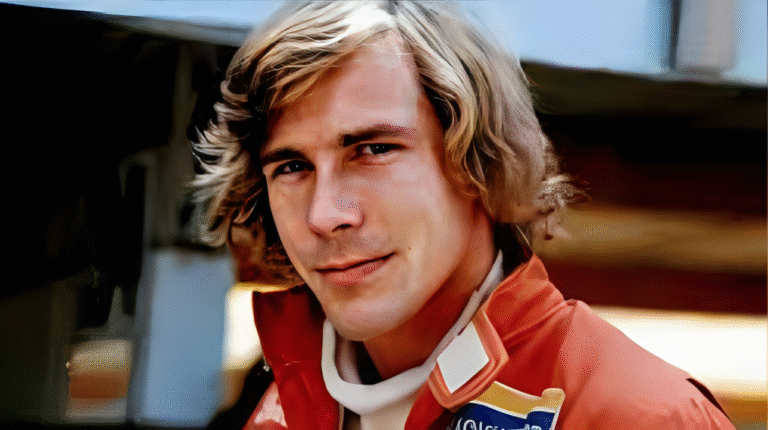Few drivers in the history of Formula 1 have left a legacy as bold, controversial, and unapologetically raw as James Hunt. Known not just for his aggressive driving style and flamboyant lifestyle, Hunt also became infamous for his blunt, unfiltered criticisms of fellow F1 drivers, both on and off the track. His sharp tongue, paired with his raw talent, made him a compelling figure in the sport’s golden era.
From calling out competitors as “bloody idiots” to mocking the establishment with scathing one-liners, Hunt’s verbal lashings became as legendary as his 1976 World Championship victory. This article explores the most iconic moments James Hunt insulted F1 drivers, his motivations, the context behind the clashes, and how these outbursts have become a permanent part of Formula 1 folklore.
The Famous Rivalry: James Hunt vs. Niki Lauda
Perhaps the most high-profile dynamic in Hunt’s career was his intense rivalry with Niki Lauda, the cold, calculated Austrian whose personality stood in stark contrast to Hunt’s volatile nature. While the rivalry was immortalized in the 2013 film Rush, their real-life interactions were even more compelling.
Though the two shared a mutual respect off the track, that didn’t prevent Hunt from verbally sparring with Lauda on several occasions. Hunt once scoffed at Lauda’s methodical driving by stating:
“He drives like a computer. It’s brilliant, but it’s not racing.”
This wasn’t just a jab at Lauda it was a shot at the growing technical and conservative approach in Formula 1 that Hunt resented. He believed racing was about guts, instinct, and aggression, not data sheets and telemetry.
James Hunt on Patrick Depailler: “A Lunatic on Wheels”
In the late 1970s, Hunt’s disdain for certain driving styles came into full view during his criticisms of Patrick Depailler, a talented yet often unpredictable French driver. After a particularly dangerous maneuver during the Canadian Grand Prix, Hunt raged in a post-race interview:
“Depailler is a lunatic on wheels. He drives as if no one else is on the track.”
These were not idle words. Hunt believed that reckless driving endangered lives, especially in an era where safety measures were minimal and fatal crashes were common. His outbursts often doubled as warnings to the F1 establishment.
“This Man Has No Place in Formula 1” – On Riccardo Patrese
Riccardo Patrese became another target of Hunt’s scorn after a series of incidents that painted the Italian driver as careless and overly aggressive. Following the tragic 1978 crash at Monza that claimed Ronnie Peterson’s life, Hunt made one of his most famous and biting accusations:
“This man has no place in Formula 1. He’s a danger to everyone.”
Hunt’s criticism of Patrese went beyond emotion it reflected a broader concern for driver safety. He later campaigned to have Patrese banned, believing he was directly responsible for unsafe conditions on the grid.
James Hunt’s Transition to Commentary: A Mic Without a Muzzle
After retiring from active racing in 1979, Hunt took his unfiltered persona to the BBC commentary box, where his colorful insights and merciless honesty made him a fan favorite. Partnered with the more measured Murray Walker, Hunt’s commentary was filled with acerbic takedowns and candid opinions.
In one famous incident during a 1989 Grand Prix broadcast, Hunt didn’t hold back when commenting on René Arnoux:
“That move was so stupid, it’s a miracle he made it into F1.”
His commentary style was not shaped by diplomacy or brand politics it was rooted in his belief that mediocrity had no place in elite racing. He often voiced frustrations at pay drivers and teams compromising talent for sponsorships, lambasting what he saw as the sport’s increasing commercialization.
Behind the Insults: The Philosophy of James Hunt
While Hunt’s words were often cutting, they were rarely without substance. Behind each insult was a deep passion for the sport and a longing for the days when drivers raced with heart, not strategy software.
He criticized not to mock, but to demand higher standards. His harsh words were fueled by a desire to preserve the spirit of racing a belief that F1 should be dangerous, raw, and emotional. In many ways, his verbal outbursts were acts of rebellion against an increasingly sanitized and corporatized Formula 1.
Legacy of a Loudmouth: Revered or Reviled?
To some, James Hunt was an arrogant provocateur, unwilling to accept the evolution of the sport. To others, he was a truth-teller, someone who said what many were too afraid to voice. Either way, his legacy endures not just because he was a World Champion, but because he remained authentically James Hunt until the very end.
Many modern F1 fans and drivers admire Hunt’s boldness. He spoke without PR filters, offered genuine insights, and held everyone to the same high standard including himself. In an era where drivers are media-trained from youth, Hunt’s authenticity remains a breath of fresh air.
Memorable Quotes That Shaped the Myth
To capture the essence of Hunt’s sharp tongue, here are a few more iconic quotes:
-
“Half the grid is just blocking the way for real racers.”
-
“Some of these drivers think a helmet makes them invincible.”
-
“He should stick to go-karts and leave Formula 1 to the grown-ups.”
Each of these comments sent shockwaves through the paddock, generating both backlash and applause. Hunt didn’t care he wasn’t here to please anyone.
Conclusion: The Enduring Influence of James Hunt’s Insults in F1
James Hunt wasn’t just a driver he was an icon of free expression in motorsport. His insults, while often controversial, reflected a deep-seated passion for pure racing. He held his peers to the highest standards and used his voice to challenge the system.
Today, in an era of corporate sponsorships, media training, and scripted interviews, Hunt’s legacy reminds us of a time when Formula 1 was as much about personality as performance. His words live on not just as insults, but as testaments to the raw, untamed spirit of racing.

